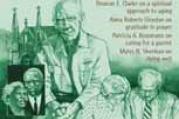Click here if you don’t see subscription options






Those Who Love Them
With gratitude, I applaud America for Of Many Things by Patricia A. Kossmann, the editorial on Elder Abuse, Elderhood for the World by Thomas E. Clarke, S.J., and On Dying Well, by Myles N. Sheehan, S.J., in the July 29 issue. I could write glowingly about each one, but succinctly say instead how refreshing it is to see America cover subjects that many in the Catholic press avoid.
My own advocacy about elder care arose when my mother was physically abused in an Illinois nursing home and my mother-in-law suffered similar mistreatment and neglect in an Indiana nursing home. (My sister and I resorted to nursing homes only after years of on-hands caregiving. Our mothers needed professional help. So, in good faith, we finally chose care centers; but we only exchanged one set of problems for another. Our mothers are now at peace with God.)
Around the same time that I discovered how harsh care can be in secular (for-profit) care centers, I also began volunteering at St. Augustine Home for the Aged, operated by the Little Sisters of the Poor in Indianapolis. What a joy to be there! The environment is consistently clean and serene, and one immediately feels the presence of Christ. If what they are doing could be replicated by all nursing homes, elder advocacy would fall by the wayside, because loved ones would enjoy proper care, safety and dignity. Residents at St. Augustine have happy elderhood, and they die well in the care of those who love them.
Shirley Vogler Meister
Indianapolis, Ind.
Crawling Crocodiles
John W. O’Malley, S.J., is too gentle with Pius IX (8/26). The pope acted in accord with his conscience. The ultimate justification used by an extremist or fanatic.
Pius IX undermined the church’s intellectual credibility with his Syllabus of Errors. By his fierce espousal of a union of church and state, he seriously affronted American views on democratic government and furnished a specific reference for anti-Catholic feeling. Cartoons by Thomas Nast featured grotesque images of Pius IX and of crocodiles, jaws shaped like bishops’ miters, crawling up to the nation’s capitol flying the papal flag.
Both scholarly and demagogic sources quoting Pius IX helped to deny full entry of Catholics into American political life. It took several generations of subsequent popes and thoughtful Catholic theologians like John Courtney Murray, S.J., the experience of Catholics and non-Catholics serving together in World War II and, in the opinion of some commentators, the coming to the papacy in 1958 of the genial John XXIII to dispel the shadow of Pius IX and in 1960 to see John F. Kennedy elected as the first Catholic president.
(Msgr.) Harry J. Byrne
New York, N.Y.
Gathered Influence
I very much appreciated the commendation by George Anderson, S.J., of the Society of Friends (Of Many Things, 8/12). Historically, the Quakers were at the forefront of the struggles against slavery, dehumanizing prison conditions and women’s inequity long before more mainstream churchesincluding the Roman Catholicgot the message.
My wife and I have often said that if we weren’t Catholic, we would have been Quaker. There would be both gain and loss in such a move. Her parents belonged to a Friends meeting 80 percent of whose budget went outside the maintenance of the meeting itself, since it neither owned buildings nor employed professional ministers. My parish recently spent $3 million to repair a roof and gild a ceiling. On the other hand, when my father-in-law was dying, despite his lifelong objection to organized religion and despite the kindness of individual Friends, an Episcopal priest (a woman) had to be imported to perform a ritual blessing that seemed to allow him to die in peace.
Nonetheless, I agree with Father Anderson that we billion Catholics have much to learn from those mere thousands of Friends whose influence continues to exceed their number.
Roger Bergman
Omaha, Neb.
Far From Easy
Thomas J. McCarthy's statements about "the infamously grueling annulment process" (From This Clay, 7/29) hardly do justice to the tribunal personnel and other pastoral ministers striving to make people as comfortable as possible in a difficult situation.
His sister's experience is unfortunate but not typical. While parties in his group claimed to "know someone who had begun the annulment process in good faith only to throw up their hands after...a chilling, humiliating ordeal," a discussion with others who stayed the course might have revealed a totally different perspective.
Nullity trials are far from easy and certainly far from perfect. While changes are needed, they will not come from one-sided presentations of the issues.
(Msgr.) John R. Amos


Did this seem strange to me? Not at all. As a student at Haverford College in Pennsylvania, I attended what was known as Fifth Day meeting. The whole student body trooped over to the meeting house adjacent to the campus for the regular Thursday morning hour of meditation. I was too immature at the time to appreciate these gatherings, as were many other undergraduates. Since Thursday was the day Time magazine arrived, one could hear the rustle of turning pages in the midst of an otherwise prayerful silence.
After Haverford, it was still a long time before I had any real sense of Quaker spirituality. It began, curiously, following my entrance into the Society of Jesus. I began to read the works of Quakers like John Woolman, who spoke out against slavery in his travels through the colonies. His journal, published in 1773, helped to confirm me in a lasting attraction to spiritual autobiographiesas did the journal of George Fox, an early leader in the Society of Friends imprisoned in England for adhering to his faith.
From their beginnings in 17th-century England, the Quakers have long been committed to the cause of justice. John Woolman’s outspoken objection to slavery is just one instance of that commitment. An English Quaker, Elizabeth Fry, led the way in prison reform in the 1800’s; her compassionate work among women prisoners, in particular, was groundbreaking at a time when they were treated with great cruelty, packed into dungeons with their children.
Concern for peace, too, is a major part of the Quaker tradition. The often-reproduced versions of The Peaceable Kingdom were the work of a Quaker artist, Edward Hicks; their theme is taken from the passage in the 11th chapter of Isaiah that speaks of the leopard and the lamb lying down together. The day I attended the 15th Street meeting, a woman rose at the end of the hour to mention a vigil for peace to be held that afternoon at the great arch on Washington Square.
As a further sign of its commitment to social justice, a building next to the meeting house hosts a year-round shelter for homeless men and women.


